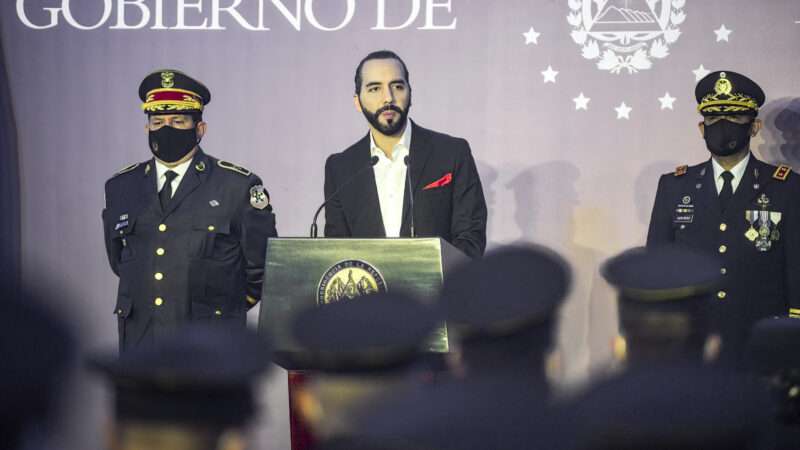
After a wave of murders left 89 people dead in one weekend, the president of El Salvador, Nayib Bukele, initiated a nationwide crackdown to target the gangs he claims are responsible. Declaring a "state of emergency," he asked the legislative branch to grant police exceptional powers for 30 days, allowing them to surveil or arrest anyone they choose without a warrant or due process. The state of emergency orders were set to expire at the end of April, but today they were extended for an additional 30 days.
In raids performed immediately after the Salvadoran Congress' approved the state of emergency on March 27, police officers executed warrantless arrests of thousands, most of whom were denied the right to an attorney and due process. United Nations investigators have raised alarms over the detentions. Family members of many of the people arrested never received an explanation for why they were detained and have reported being unable to reach them or obtain information on their cases.
The state of emergency has also denied civil rights to anyone else arrested for any crime at all— detainees face weeks in notoriously overcrowded prisons without legal counsel or charges. A 21-year-old musician died in a Salvadoran prison after being arrested without charges. His family alleges he was beaten to death, but the government refuses to perform an autopsy or open an investigation.
According to Bukele, police have arrested more than 17,000 "suspected gang members"— an astonishing number for a country with a population of just 6.5 million.
Though human rights organizations and journalists in El Salvador have strongly criticized what they describe as a "disturbingly authoritarian suspension of civil rights," Bukele is doubling down. A law passed by Congress in April that prohibits the publication of "any gang communication" punishes journalists who report on any gang activities with up to 15 years in prison.
Furthermore, reports from Human Rights Watch (HRW) and Salvadoran journalists suggest that police may be arresting suspects arbitrarily, especially in poor neighborhoods, to inflate numbers. Bukele denies this, insisting that the measures are necessary and that those arrested are "terrorists" and "gang members."
This latest crackdown comes after years of accusations by international media and the U.S. government that Bukele agreed to a power-sharing deal with gangs when he took office in 2020.
"The administration has created a narrative of propaganda about the gangs," Juan Martinez, founder of the Salvadoran newspaper El Faro, tells Reason. "In this narrative, Bukele's authoritarian measures over the years were necessary to fight corruption, and the gangs were nearly defeated. But this narrative just isn't true."
Martinez says that the truce Bukele had in place with gangs has fallen apart and the government is now desperately trying to build a new narrative by demonstrating how they are "tough on crime."
"We were attacked because we showed the truth," says Martinez, who fled the country after the president accused him of being affiliated with the gangs the government claims to be fighting. He says he has faced death threats and that journalists in El Salvador understand the risks that come with criticizing the government. "We are all nervous. My family fears for their lives. My colleagues are under attack."
Juan Pappier, chief investigator for the Americas at Human Rights Watch, says his organization has also been threatened by Bukele, who accuses them of supporting" the gangs and has mockingly called them "Homeboys Rights Watch."
"Attacking the messenger instead of responding to the accusations is a classic reaction by authoritarian leaders such as Nayib Bukele," Pappier tells Reason.
This isn't the first time Bukele has been called an autocrat. Last year, he replaced the entire Constitutional Court with loyalists. He's also used the police to target his critics and opposition.
Pappier thinks Bukele has gone too far, "The government is very clearly trying to intimidate those who criticize them." For now, Bukele's policies remain very popular with his base, who support a "tough on crime" approach, but the young president may find it hard to maintain support as he embraces an increasingly vindictive populism.
The post El Salvador Detains 17,000 'Suspected Gang Members' Without Due Process appeared first on Reason.com.







